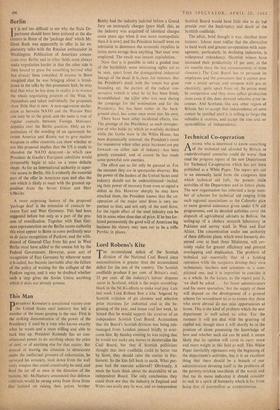Lord Robens's Kite
THE accumulated deficit of the Scottish division of the National Coal Board since nationalisation is greater than the accumulated deficit for the rest of the country. The Scottish coalfields produce 8 per cent. of Britain's coal; 33 per cent, of the indtthtry's labour disputes occur in Scotland, which is the major stumbling- block in the NCB's efforts to make coal pay. Late last week Lord Robens flew a kite. Angered by Scottish criticism of pit closures and selective price increases for industrial coal at the be- ginning of the year, and house coal last week, he hinted that he would support the creation of an independent Scottish Coal Board. Accusations that the Board's Scottish division was being mis- managed from London seemed briefly to over- come him. By Sunday evening he was saying that he would not make any moves to decentralise the Coal Board, but that if Scottish politicians thought that their coalfields could be better run by Scots, they should raise the matter in Par- liament. So the kite fell back to earth. What pur- pose had the exercise achieved? Obviously, it made the Scots think about the desirability of an independent Board. The only conclusions they could draw are that the industry in England and Wales can easily pay its way, and an independent Scottish Board would have little else to do but preside over the bankruptcy and death of the Scottish coalfields.
The affair, brief thought it was, clarified three truisms: labour must realise that the alternative to hard work and greater co-operation with man- agement, particularly in declining industries, is widespread redundancy. (Scottish miners have increased their productivity 13 per cent, in the six months since the last announcement of mine closures.) The Coal Board has to persuade its employees and the,consumers that it cannot pro- vide a social service and compete with gas or electricity, quite apart from oil. Its prices must be competitive and they must reflect production costs even. if this does demand selective price in- creases. And Scotland, like any other region of Britain. has to accept that independence of sorts cannot be justified until it is willing to forgo.the subsidies it receives, and accept the cost and re- sponsibilities of independence.


































 Previous page
Previous page